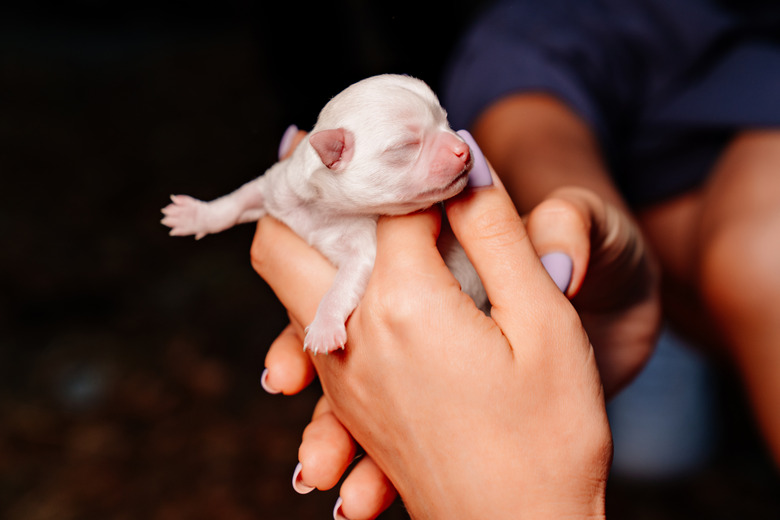Newborn Chihuahua Puppies: Facts About Baby Chihuahuas
The tiny dog breed known today as the Chihuahua dates back more than 1,000 years to the Toltec and Aztec peoples of Mexico. This pocket-size pup's big-dog attitude and loyalty to family make Chihuahuas one of the most popular breeds in the United States today. Although the dog is typically hardy, living up to 16 years, baby Chihuahuas require special care to get a good start in life.
They're tiny but not toys
They're tiny but not toys
Chihuahuas are the only naturally occurring toy-size breed of dog. Other toy breeds are bred from larger versions of their breed, such as toy poodles. They descended from an ancient breed known as the Techichi, and carvings on temple walls in Latin America show carvings of the tiny breed.
Today's Chihuahuas are actually larger than their ancient counterparts. Newborn puppies can weigh as little as 2.5 ounces, but they'll quickly double their size as they increase in weight by 5 to 10 percent each day until they reach 2 pounds or more. Larger newborn pups might be born at 5 ounces, reaching a top weight of 6 pounds or so at 12 months.
Born with big heads
Born with big heads
Some Chihuahuas are sought after for their cute, apple-shaped head, reflecting the official breed standard of the American Kennel Club. Others with a more sloping forehead and a longer nose are known as deer head Chihuahuas and are also desirable.
However, these big heads can cause the mother to have difficulty giving natural birth to her pups. Because the breed is small and slightly built, big heads on pups trying to emerge through narrow hips can necessitate a Cesarean section for pups to be safely delivered. Regular veterinary care during pregnancy is essential.
Newborn Chihuahuas with holey heads
Newborn Chihuahuas with holey heads
Besides having big, round heads, some Chihuahua babies have a soft spot above their eyes where their skull bones haven't fused together. This hole in the skull, known as a molera, isn't usually anything to worry about. In fact, a newborn teacup Chihuahua is likely to have one.
Moleras used to be common in the breed decades ago when the breed standard was for dogs 2 pounds or less. Now that the breed incorporates dogs 6 pounds or less, the signature "hole in the head" is becoming less common.
The molera might close as a pup matures. However, some Chis live their entire life with a soft spot. If your puppy has a molera, be careful not to injure it.
Pups can get pregnant
Pups can get pregnant
Female Chis can get pregnant during their first heat cycle, which can occur when they're as young as 4 months old. A tiny female Chihuahua can get pregnant by a much bigger male dog. The large dog genes can make the puppies inside her be relatively large for her body size, increasing the risk to both mom and pups.
As your dog will only be pregnant for three months, be sure to bring her to a vet as soon as you suspect she could be gravid. Your veterinarian can monitor her health and the growth rate of the puppies inside and determine whether she will be able to successfully give birth naturally.
They need to eat frequently
They need to eat frequently
With such little bodies, Chihuahua babies don't require a large quantity of food; however, they do need to be able to eat often. Chihuahuas don't have much fat around their liver and are therefore prone to hypoglycemia (low blood sugar). Too much exercise or play can trigger a hypoglycemic attack.
Chis with hypoglycemia should be fed a sugar-based liquid (such as sugar in water) through an eyedropper. Consult your vet for the best formula to keep on hand for your little friend. You must treat hypoglycemia immediately, or your dog could go into shock and die.
It's pretty common for newborn Chihuahua puppies to experience calcium deficiency when they are about 2 weeks old. Like hypoglycemia, the symptoms include staggering and having a hard time standing. A calcium supplement dissolved in water (such as Tums) can bring your pup back to feeling strong again in about 15 minutes.
